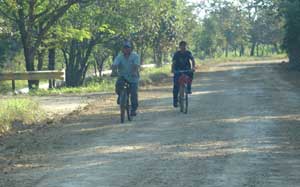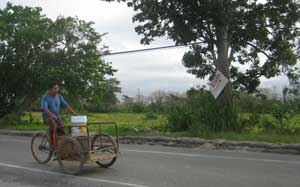Bicycling
In many parts of the world, the bicycle is a major form of wheeled transportation. China, for example, has been described as the "bicycle kingdom." The recent economic growth in China has enabled more people to afford automobiles. Thus the number of cars on its roads has risen sharply. On the other hand, concerns about pollution and global warming due to motor vehicle emissions have led to increased popularity of the bicycle in countries dominated by automobile transportation.
|
Photo courtesy of Rafael M Sanchez Caldera Around the world bicycles are a basic form of transportation, whether on the crowded pavement of a city or the dirt roads of the country. |
Many places encourage bicycle use. In Paris, France, for example, the city government started a system of communal bicycles that can be used for a nominal fee. The bicycles, called velibs (from velo for "bicycle" and liberté for "freedom"), can be picked up and dropped off at stations all over the city. In the United States, some colleges and universities give bicycles to their students at no cost. For children and teens, bicycling can be a fun pastime or a means of getting around. All this means that there are a lot of cyclists in the world.
|
Photo courtesy of Rafael M Sanchez Caldera A three-wheeled cycle makes it easier to move cargo. |
Many cities promote bicycle use by providing safe parking spaces and special traffic lanes. |
Photo courtesy of Rafael M Sanchez Caldera In cities and towns, bicycle riders share the roads with the larger cars, vans, and trucks. It is important for the cyclist to make himself visible to the drivers of these vehicles, and to wear a helmet for protection. |
In some places, special bicycle lanes run alongside the roads. But in most areas, bicycles share the road with many other types of vehicles: automobiles, trucks, motorcycles, buses, and even animal-pulled carts. So how can a cyclist stay safe among all that traffic?
Bicycle safety started with the vehicle itself. Safer bicycles meant safer riders, and history tells the tale.
This content has been re-published with permission from SEED. Copyright © 2026 Schlumberger Excellence in Education Development (SEED), Inc.





